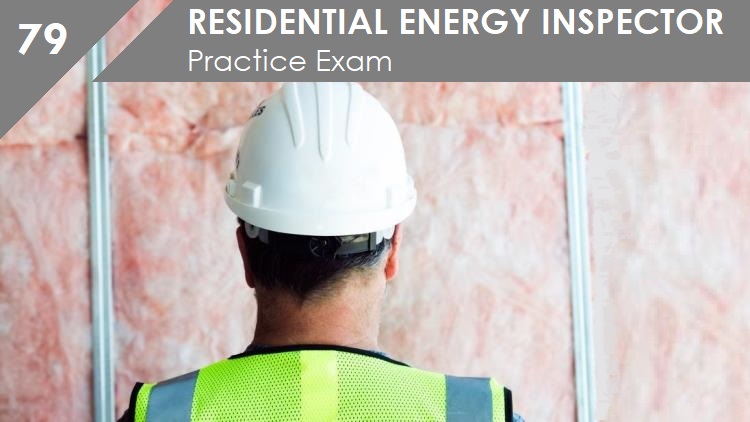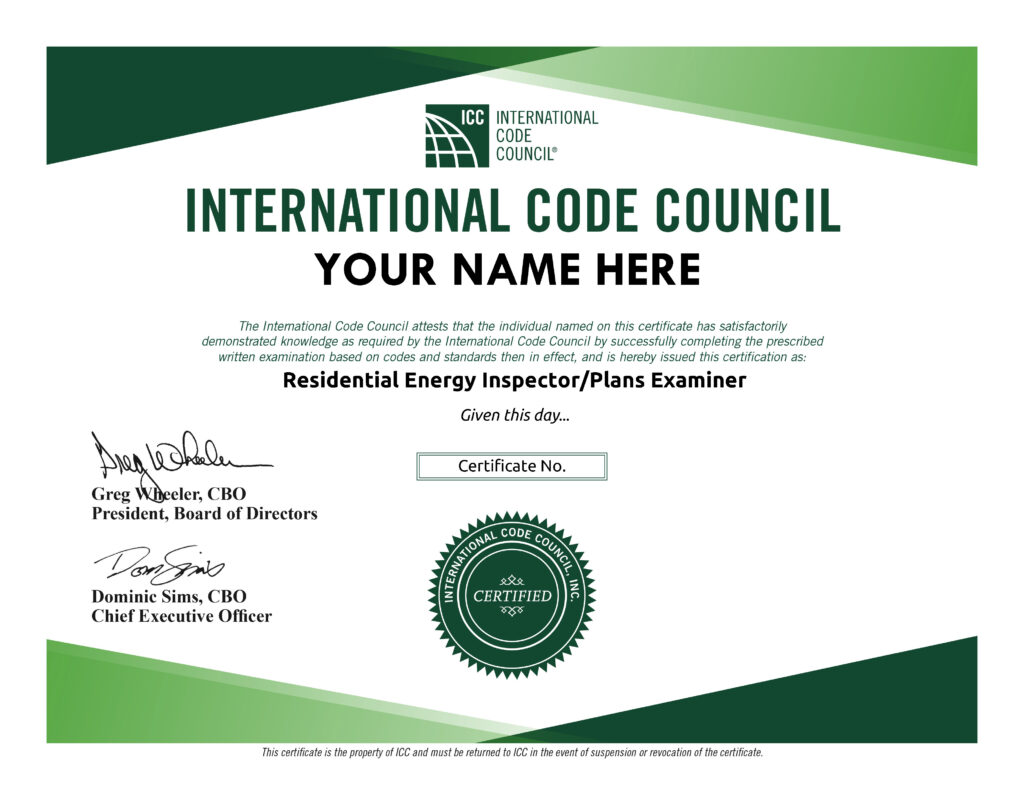
$34.99
Includes 2 Practice Exams, 50 Questions Each
Have you ever desired to become a Certified Residential Energy Inspector/ Plans Examiner?
Well your first step is to know a little bit about the exam itself and what areas you should be studying for.
The ICC Residential Energy Inspector / Plans Examiner Certification Exam administered by the International Code Council (ICC) tests an individuals knowledge of the International Energy Conservation Code (IECC).
As a Certified Residential Energy Inspector / Plans Examiner you will be responsible for performing plans examination, and inspection of energy conservation materials and construction methods and practices as it pertains to residential structure as defined in the IECC.
Residential Energy Inspector/ Plans Examiner Exam Specifications
The exam consists of 50 multiple-choice questions. You have a time limit of 2 hours to complete the exam and it is open book meaning you can only use the code book referenced by ICC. For this exam it is the International Energy Conservation Code (IECC).
The code edition of the reference used should reflect the code edition of the exam you are taking. For example if you plan to take the 2021 version of the exam, you should use the 2021 International Energy Conservation Code. No work experience is required to take the exam and you must be at least 18 years of age.
The International Code Council (ICC) requires you to take the exam through the PRONTO system.
PRONTO is a new way of taking your testing exam from the comfort of your home or office. PRONTO stands for Proctored Remote Online Testing Option. For more information about the PRONTO online testing option, click here.
So what does the ICC Residential Energy Inspector/ Plans Examiner exam cover?
This exam covers 4 main areas such as:
- General Plans and Inspection
- Alterations, Additions, and Change of Use or Occupancy
- Building Envelope
- Mechanical Systems
The following exam content outline can act as a study guide to help you study for the exam and to gain an understanding of what the exam will cover.
General Plans and Inspection | 28% |
Applicability | 4% |
Adequacy Of Construction Documents | 2% |
Location | 2% |
Building Thermal Envelope Compliance Documentation | 4% |
Total UA Alternative Compliance Documentation | 4% |
Simulated Performance Alternative Compliance Documentation | 4% |
Systems Compliance Documentation | 2% |
General Inspection Tasks | 6% |
Alterations, Additions, and Change of Use or Occupancy | 16% |
Conditioned Space | 10% |
Change of Occupancy | 6% |
Building Envelope | 46% |
General Envelope Requirements | 4% |
Envelope Compliance | 20% |
Glazing and Doors | 18% |
Air Leakage and Moisture Control | 4% |
Mechanical Systems | 10% |
Duct and Piping Systems | 4% |
Controls | 2% |
Equipment Installation | 4% |
What do you get when you pass the exam?
Certification
Bragging rights! Well actually you will receive a pass letter the same day right after your exam. You will have a certification number assigned to you so that if someone were to search for a certified professional within the ICC website, your name will come up! In addition to being a Certified Residential Energy Inspector / Plans Examiner (Yayyy!) you will receive a wall certification that looks like this…

Need Practice?
Why not try our Residential Energy Inspector/ Plans Examiner Practice Exam?
Want to test your knowledge of how well you know the code? Or maybe just get a feel for the exam?
Try out our Practice Exam for the Residential Energy Inspector / Plans Examiner Certification Exam!
This practice exam is designed for those who are looking to take the 2021 or 2018 version of the ICC Residential Energy Inspector / Plans Examiner Certification Exam through the International Code Council (ICC). These practice exams are intended to help you prepare for the actual exam by helping you navigate through the code book to familiarize yourself with the specific code sections. They will test your knowledge on the exam content areas covered to improve your chances of passing the certification exam.
This is a great way to prepare yourself for the actual exam administered by ICC. Every building code professional knows that the key to passing the ICC exams is to do practice problems. Don’t just take the exam purely on experience alone. Let this resource get you focused on realistic problems built around the exam content being covered.

$34.99
Includes 2 Practice Exams, 50 Questions Each
Happy Test Taking!
Related Articles to Read:
